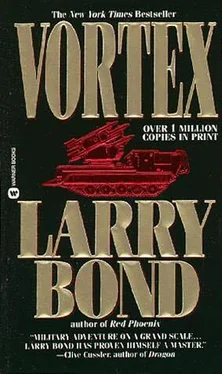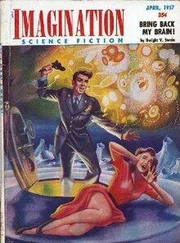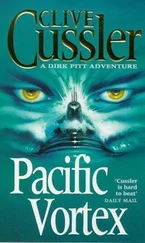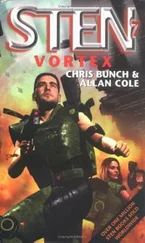Smoke from burning buildings and vehicles swirled across the street and billowed high into the air-joining a dense pall produced by fires raging out of control all across Cape Town. Taylor coughed as he breathed in the acrid stuff. He tilted his helmet back up off his forehead and looked closely at his new secondin-command, Capt. John Hastings.
“You’re sure about this, Johnnie? It’s not just another damned rumor?”
Hastings shook his head.
“I talked to the new base commander myself. It’s official. Simonstown has come over to our side! “
Both men ducked again as another mortar round landed in the botanical gardens close by, showering them with dirt, grass, and pieces of mangled plants.
Hastings spat dirt out of his mouth and continued, “The Navy boys said they’d had some fighting with a few diehards, but they’ve got everything under control for the moment.”
“Damage?”
“A few fires, but no damage to the docks or ships.”
That was welcome news. Taylor had been hoping for support from the naval officers and ratings stationed at the Simonstown base. The Navy had always been the most “English” of all the South African military services. And even though its total strength didn’t amount to much more than a few aging ships, holding South Africa’s main naval base would give the provisional government’s claims to independence needed national and international credibility.
He refolded the map and rolled out from behind the APC, seeking a better view of the house-to-house fighting raging up ahead. Hastings followed suit.
Cape Town, once arguably the most beautiful city on the African continent, now looked more like wartime Berlin.
The ugly debris left by war marred the long, broad expanse of Government
Avenue and its adjoining botanical gardens. Buildings were pockmarked by bullets, mortar and grenade fragments, and cannon shells. Bodies lay here and there some crumpled on the street or pavement, others draped over rose bushes and park benches or sprawled on gravel paths. Some of the dead wore civilian clothes, others were in uniform. Strips of white cloth fluttered in a light sea breeze, tied around the outstretched arms of those who’d fought against Pretoria.
A wrecked APC blocked part of the avenue, orange flames licking skyward as its fuel tanks burned. A single charred corpse hung half in and half out of the commander’s hatch.
Taylor swallowed hard against the taste of bile, forcing himself to ignore the butchery before his eyes. Despite all the signs of slaughter, he and his men were winning. The flickering, pinprick flashes of rifle and machinegun fire that marked his battle line were farther away than when he’d last looked. And he could see an Eland armored car moving slowly forward, stopping briefly from time to time to shell buildings farther down the street. Small figures clustered along each side of the armored car, sometimes crouching for cover, but always advancing.
He nodded to himself. Vorster’s loyalists were definitely giving ground, falling back toward Table Mountain.
Taylor lifted his eyes to the flat-topped mountain rising south of the city. The escarpment loomed ominously over Cape Town’s tallest skyscrapers-a massive edifice of jagged rock covered by what looked like a thick layer of fluffy white cloud. A rippling series of red and orange flashes from the summit reminded him that the white haze wasn’t cloud at all. It was smoke from an artillery bombardment-a barrage so intense that it shrouded the entire top of the mountain.
He frowned. His gunners were firing everything they had at the fortified caves and bunkers held by government troops, hoping to knock out the artillery pieces em placed there, but it seemed likely to be a vain effort. Those fortifications were too strong to be suppressed by long-range bombardment. They’d have to be taken in a bloody succession of set-piece infantry assaults.
And that was the problem. Taylor now had enough men under his command to clear the city of Vorster’s troops. But he didn’t have enough infantry, armored vehicles, or artillery to finish the job by seizing Table
Mountain. As a result, the
battle seemed headed for certain stalemate. He and his fellow rebels might control Cape Town, but loyalist artillery batteries and troops trapped on the escarpment would dominate both its harbor and international airport.
Taylor hugged the pavement as more mortar rounds rained down on the gardens ahead, knocking down trees and smashing already shattered greenhouses.
Windblown dust, dirt, and smoke cut visibility to a matter of meters in seconds.
He rolled back into cover, reaching for his command phone. Table Mountain would have to wait. He had more immediate problems.
Behind him, the setting sun dipped lower, dropping steadily toward the western horizon. Night was falling across a South Africa now fully engulfed in bitter civil war.
NOVEMBER 11 -- HEADQUARTERS, 20TH CAPE RIFLES, VOORTREKKER HEIGHTS MILITARY CAMP, NEAR PRETORIA
Furnace-white arc lights burned all along the perimeter of the Voortrekker
Heights Military Camp-stripping the night away from barren brown hillsides. No trees, clumps of brush, or even patches of tall grass remained either to soften the outlines of those rugged slopes or to conceal an approaching enemy. Together, the perimeter lights and the empty kill zones they fit made it impossible for anyone to mount a successful surprise attack on South Africa’s major military headquarters. But the dazzling glare also washed out any glimpse of cold, clear stars speckled across a pitch-black sky or the warm, golden glow of Pretoria’s streetlamps and cozy homes.
Commandant Henrik Kruger regretted that. Any reminder of life outside this sterile military encampment would have been welcome.
Since leaving the Namibian front more than a month be4”
fore, his battered battalion had been penned up among Voortrekker Heights’ drab, look-alike barracks, parade grounds, maintenance sheds, and vehicle parks. Some high-ranking nitwit in the Ministry of Defense had ordered all enlisted personnel and noncommissioned officers restricted to base.
He and his officers had stayed with them, determined not to let a piece of bureaucratic idiocy endanger bonds of trust and loyalty forged in combat. Still, he had to admit to himself that he also had other, more personal reasons for avoiding Pretoria or nearby Johannesburg.
He was afraid that even the sight of their bustling streets, shops, and restaurants might awaken painful memories of his brief, happy time with
Emily van der Heijden-memories that were three years old now. True, he’d known that their engagement was mostly her father’s idea, but he’d hoped that he could reconcile her to the thought of their marriage. In retrospect, it had been a foolish hope. The gaps between their ages, their politics, and their interests were simply too wide to be easily bridged.
Kruger smiled crookedly. He’d been alone and aloof for most of his adult life-content in the masculine, monastic world of the professional military. Given that, it was strange that he should have found the one woman of his heart, only to learn that she had no room in hers for him.
He gripped the wood railing of his veranda until his knuckles stood out white against the surrounding blackness. With an effort, he forced his mind away from lasting personal grief to professional concerns.
Such as this absurd decision to keep his battalion confined to
Voortrekker Heights. Vorster and his minions must fear that exposure to the political dissent and economic hardship sweeping the country might tempt their soldiers to commit treason or desert. So they’d denied his troops and the other weary combat veterans returning from Namibia promised home leaves, weekend passes, and any other opportunity to escape the rigid confines of a military life for even a short while.
Читать дальше












